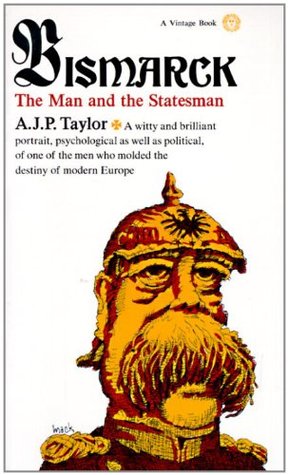More on this book
Kindle Notes & Highlights
He was the clever, sophisticated son of a clever, sophisticated mother, masquerading all his life as his heavy, earthy father.
Yet his great strokes of policy came after long solitary brooding, not after discussion with others.
‘Doubt was not fought and conquered; it was silenced by heroic will.’
He spent the twenty-eight years of supreme power announcing his wish to relinquish it; yet no man has left office with such ill grace or fought so unscrupulously to recover it. He despised writers and literary men; yet only Luther and Goethe rank with him as masters of German prose.
He claimed to serve sometimes the king of Prussia, sometimes Germany, sometimes God. All three were cloaks for his own will; and he turned against them ruthlessly when they did not serve his purpose. He could have said with Oliver Cromwell, whom he much resembled; ‘He goeth furthest who knows not whither he is going.’
When one of his conservative friends said that Austria had right on her side, he answered: ‘I don’t recognize any right in foreign policy.’
All the great questions of our own day, from the defeat of Hitler to the checking of Soviet expansion, have been determined by blood and iron. It is the task of the idealist to put moral clothing on the victor. Bismarck never acquired this art.
All wars are a struggle for power, but a practical occasion for their outbreak is usually found. In 1866 there was no disguise; Austria fought for her primacy, Prussia for equality.
Yet Bismarck’s greatest struggle was still to come. The obstacle which almost broke his will was William I. The king had never understood Bismarck’s far-reaching plans and had been dragged reluctantly into war. He had given way only when convinced that Austria and her German allies were planning to attack him. Now he regarded them as wicked and insisted that they be punished. For him, as for many lesser mortals, war was a matter of moral judgement, not an instrument of power.
He said to William: ‘Austria was no more in the wrong in opposing our claims than we were in making them’—an even-handed judgement that will stand as the verdict of history, but not one likely to appeal to a simple-minded Hohenzollern.
There has never been a clearer dispute between the moral and the ‘real’ view of politics; the more fascinating in that William was advocating a more severe peace with Austria and a less severe peace with the princes—but both on moral grounds. Bismarck used all his most powerful weapons—tears, hysterics, the breaking of crockery, even the threat to jump from a high window.
He insisted during the peace negotiations on the impossibility of including ‘the German-Catholic-Bavarian element’: and he wrote to his wife, with obvious sincerity: ‘There is nothing more to do in our lifetime.’ If south Germany was beyond his ambition, how much more then the Austrian empire. It would last his time; and he wanted its friendship. He said immediately after Sadova ‘We shall need Austrian strength for ourselves later.’
Bismarck may have intended ‘to ruin parliamentarianism by parliamentarianism’, as he himself boasted. In fact, he made Germany a constitutional country. Not only was the franchise the widest in Europe, with the only effective secret ballot. The parliament possessed every essential function. It was the seat of power. The King of Prussia, later called German emperor, directed the executive; but so did, and does, the president of the United States. And both president and emperor were closely bound by the terms of a written constitution.
Each admired the actor in the other, and characteristically each noted the beauty of the other’s voice. Both had the brooding melancholy of the Romantic movement in its Byronic phase; both had broken into the charmed circle of privilege—Bismarck as a boorish Junker, Disraeli as a Jew; both had a profound contempt for political moralizing.
but they both started from the same point—the loss of faith in laissez-faire.
All revolutionaries become conservative once they are in power;
Bismarck’s claim to be the indispensable man seems more justified when foreign affairs are brought into the picture. Here his uncanny sensitivity and his inexhaustible expedients had always made him a worker of miracles; and in the eighteen-eighties he developed a diplomatic mastery without parallel. He was the Napoleon of alliances; and, unlike Napoleon, he never met his Moscow or his Waterloo.
it was intensely disliked by the overwhelming majority of Germans. The nation, divided in all else, was united in hostility to Russia. This was shown both at the outbreak of the first World war and in June 1941. It was equally clear in Bismarck’s time. Only the old emperor, with his fading memories, agreed with Bismarck. All other Germans looked on Russia as their enemy, though the Russians asked nothing except to be left alone.
Most deeply he feared that war against Russia would be a war to the death. Wars with other Powers could be fought, as he had fought them, for limited objects. War with Russia must end in the destruction of one or other combatant, as Napoleon had found and as Hitler was to find later on.
His greatest, and most admirable, quality was to be content with limited success;
The Triple Alliance showed Bismarck’s determination, almost his obsession, to keep the Pomeranian grenadier out of the Balkans. He would do anything rather than support Austria-Hungary there; he would even risk a war for Italy’s sake against France.
No human beings existed for him except his wife and children; there was no thought of his great achievements, no hint of policy for the future; the German Reich, it seems, had been brought into existence solely to save Bismarck from boredom—


